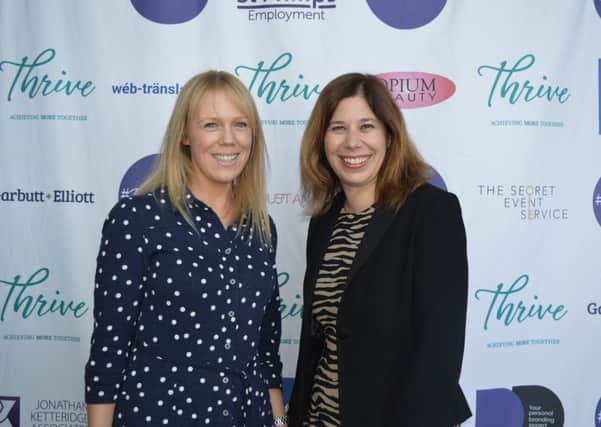Lizzie Murphy: Every business woman has a story to tell


But as I sat on a media panel in between two high profile broadcast journalists, I wasn’t sure my story cut it.
My career path from local trainee reporter to regional business journalist, albeit via some interesting news stories and two broken wrists (a journalist with two broken wrists isn’t ideal) was no match against former BBC News and ITV News programme editor Camilla Mankabady and former BBC Look North presenter and Yorkshire Post columnist Christa Ackroyd. So I thought.
Advertisement
Hide AdAdvertisement
Hide AdI was a panellist at the Thrive Women event at the Everyman Cinema in Leeds, which focused on visibility in business and how to raise your profile in the media, hosted by Thrive Law’s managing director Jodie Hill.
After the introductions, the discussion was opened up to audience questions.
How do we encourage young women to be more aspirational? was one of them.
My answer was that I believe we have to tell more stories of those at the top - both the struggles and the triumphs.
Women tend to conceal their talents and abilities.
Advertisement
Hide AdAdvertisement
Hide AdThere are lots of hugely inspiring women at the top of their profession in Yorkshire but we don’t hear about them as often as men because many women are not as keen to shine a spotlight on themselves.
Often it’s because they don’t realise how motivating their story could be to other people. Sometimes it’s down to a lack of confidence.
For others it’s because there are so many pressures on their time.
Women, whether in senior positions or not, often find themselves being pulled in lots of different directions, from family commitments to work pressures, more so than most men.
Advertisement
Hide AdAdvertisement
Hide AdYet if women don’t show the next generation the options available to them, how can we expect the gender gap to close?
According to research by the Federation of Small Businesses, women in enterprise are playing an increasingly important role in driving UK economic growth.
Businesses owned by women contributed £105bn GVA to the UK economy last year, a 40 per cent increase from 2012.
But despite the growth, just 22 per cent of small-and-medium-sized businesses are majority women-owned.
And that’s where role models can help.
Advertisement
Hide AdAdvertisement
Hide AdFindings by the Women’s Business Council in 2015 suggested 83 per cent of women who have started their own business, knew someone else who had done the same.
According to Julianne Ponan, chief executive of Creative Nature Superfoods, hearing about the struggles faced by other women business owners - and their achievements, despite the obstacles - can inspire women to believe “if they can do it, I can do it”.
The best role models are those who can share their story and motivate others.
In particular, we need the women at the top of STEM businesses to come forward with their stories to galvanise future generations.
Advertisement
Hide AdAdvertisement
Hide AdProfessor Liz Towns-Andrews, chief executive of the 3M Buckley Innovation Centre in Huddersfield, also believes a rethink is needed on how science, technology, engineering and maths (STEM) subjects are taught in schools to make them more appealing to girls.
Speaking to The Yorkshire Post last year, she said: “What makes it cool to boys quite often is communicating engineering in the terms of Formula One or High Speed Rail.”
She added: “I’m adamant that STEM is not the future. STEAM, science technology engineering arts and mathematics, is the future.”
Following the Thrive Women event last Friday, I was inundated by some fascinating businesswomen both in person and on social media, keen to share their own stories and even ask questions about mine.
Advertisement
Hide AdAdvertisement
Hide AdIt just goes to show that if, like me, you don’t think you have a story to tell, you actually probably do.
As Ms Ponan said: “Every single woman out there has a story to tell. Even if they tell one person, it will make a difference.”